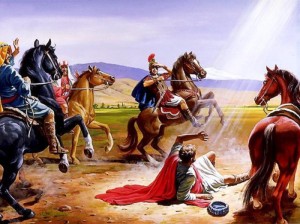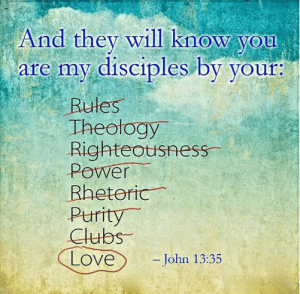Saul was a Jewish theological juggernaut, a mastermind of faith theory, a scholar of who God is and what God wants and how God acts.
And he was completely wrong.
Not only was he completely wrong, he was completed determined, so much so that he was blinded to the truth – his theology was so inflexible the Christian message couldn’t even get through to him.
Jesus had to personally show up on the road to Damascus and blind Saul to jar him out of his fixed theological assumptions, his judgmental faith attitude, his spiritual blindness.

This is a cautionary tale Christians should take to heart.
Saul was the perfect Pharisee – so wrapped up in rules and technicalities, legalism and judgment, theories and rote practices that he actually missed the character of God. He didn’t value relationship, love, unity, or evangelism. These are the values of God. Sharing, not hoarding. Caring, not cursing. Building up and uniting, not tearing down and dividing. Faith is not a checklist to perform, but a partnership between God and people with the goal of bringing more people in, not drawing lines to push more people out.
Our theologies today rarely matches these stated goals any better than Paul’s.
It is a natural assumption to believe that whatever we were taught growing up is the only thing that could possibly be true. The problem is, churches are rarely good at teaching. They might be gifted at indoctrination, but teaching where the intellect is engaged and questions are asked and options are discussed is rare. Discipleship is pretty bad in most every Christian church I’ve served in.
And the natural result of this is Christians who believe they are the only right ones. People like Paul. People who think they are scholars on everything about God. People who cast anyone who doesn’t believe exactly like them, or practice exactly like them, “out” of the community of Believers.

Many find the faith not worth journeying into because of all the judgment and division they see. Not diversity – division. Diversity is a situation where differences are productive, welcome, and even beautiful – to be desired. Division is where differences drive wedges between people, making each group feel like they are exclusively right or superior. There can be unity with diversity, but no unity with division.
What is the solution? I dare say, education. This can be tackled with churches doing a better job at educating members on not only their own version of God-study but also with the alternate beliefs of other Christian movements. This can be tackled with a renewed focus on discipleship as well. But, lucky for us and lucky for you – and can also be tackled right here in a blog.
Over the next few weeks we want to take you on a journey of theological diversity. Most people don’t realize how diverse and widespread and beautiful Christianity truly is. Many think the way they learned to practice the faith is the only way anyone is allowed to – and this view is foolish from the start, as Christians have always celebrated and worshiped and fellowshiped in different manners across the ages, across the globe, and across cultures.
Many also think they way they learned to think about faith is the only way anyone is allowed to – again, foolish from the start as the Bible leaves so many things unclear. For a quick vague example, just look at Genesis 1 – is it literal or literary? Young earth, old earth, theistic evolution, instantaneous creation, creation staggered over 7 days or even 7 ages – the variables allow for a wide range of options for how to understand God’s act of making us. So it would be foolish to believe your view is the only one possible, even if you feel comfortable with it and think it is more likely than other views.
“I have not learned wisdom, nor have I attained to the knowledge
of the Holy One. Who has gone up to heaven and come down?
Whose hands have gathered up the wind?” – Proverbs 30:3-4
We plan to tackle a wide range of topics to discuss the various ways Christians have believed or practiced historically as well as across the wide spectrum of denominations today. We’ll talk about practices, like communion and baptism. We’ll talk about believes, like sanctification and atonement.
The hope is that Christians can learn to recognize each other better. Nothing sickens churches as much as pretending you’re always right and treating all other churches like they aren’t really Christians. Nothing defeats evangelism faster, either. Christ said we’d recognize each other by our love – not by our theological correctness.

That doesn’t mean theology doesn’t matter. And it doesn’t mean that certain things aren’t clear. It just means that the number of things that are clear are fewer than most Christians suppose – the theological things that are open for debate are extremely common and we must learn to discuss them with civility and to accept each other as family in Christ despite disagreements.
I’ll close with a wonderful analogy from C.S. Lewis. Christianity is like a hall surrounded by many rooms. The hall contains all things every Christian agrees on. God exists. Jesus is savior. Basic propositions that every single Christian can agree on – in fact, must agree on to be a Christian. Someone who doesn’t agree with them is still outside the building – they haven’t entered the hallway yet.
 Yet, the hall is just a place to unite and come together – it is not a place to live. You live out faith in particular rooms. Off the hall are rooms with every variety of belief or expression. It’s all the denominations, all the various theologies, all the theories, all the preferences. You become a Christian by entering the hall but then you try out different rooms till you find one to live in for a while.
Yet, the hall is just a place to unite and come together – it is not a place to live. You live out faith in particular rooms. Off the hall are rooms with every variety of belief or expression. It’s all the denominations, all the various theologies, all the theories, all the preferences. You become a Christian by entering the hall but then you try out different rooms till you find one to live in for a while.
The problem today is that Christians stand at the door of their room yelling across the hall at other rooms, saying “You’re not Christians” and “You false teachers!” The result is not to attract more people to their own room, but rather the opposite – to drive people out of the hall completely. More than any other thing, division and disunity destroy evangelism and discipleship today.
It’s time to learn more about the beautiful variety and diversity Christian faith allows for, so as to better welcome our brothers and sisters and make a family worth inviting outsiders into. Coming soon…
“Christian faith is a wider, deeper river than the
small puddles many Christians swim in.”
Other articles for this series:
Theological Variety: Communion

Well said and looking forward to the upcoming posts!!
LikeLiked by 3 people
Thanks brother! We’ve been researching a while now, I hope we deliver to expectations!
LikeLike
This looks fantastic! I’m super excited to read more. We desperately need to learn to listen to each other, even when we don’t agree. We can still respect one another and learn from each other. Our perspectives are widened when we hear from people with different perspectives. The world is not black and white. It’s more of a misty gray in most places.
LikeLiked by 3 people
Yes, thank you so much! We’ll try to keep this intro article updated with links to each new article, to keep them easy to find! Appreciate your encouragement!
LikeLiked by 1 person
Great article! I think this is something crucial that we need to hear in the church today. So many Christians today only see people in other denominations and subgroups as their enemies and opponents to criticize and cut down, instead of seeing them as brothers and sisters, part of the body of Christ to love and support in spite of our differences. It brings only hurt to everyone involved and the name of Christianity in general. Thanks for trying to bring unity and understanding to this issue. I’m enjoying this series a lot.
LikeLiked by 2 people
Thank you for dropping by! I was shocked to see a bunch of Protestants on Facebook discussing whether Catholics are “really Christians” and it helped me to realize how much theological education – about our similarities as well as our differences – is lacking! I guess a lot of this comes down to needing better discipleship in faith circles!
LikeLiked by 1 person
Unfortunately that type of flawed, legalistic thinking seems common among different denominations, particularly in the fundamental circles I was raised in. It’s so freeing to realize that it’s possible to have unity even among diversity!
LikeLiked by 2 people
Wow = Excited by the prospect of the insight and debate.
Where two people, or more, come together with the aim of creating shared mutual understanding there is generally much learning and much profess
Thank you for taking this challenge on
LikeLiked by 2 people
Thanks Bob! We feel that when Christians come together to discuss – even when debating – it widens our recognition of who all belongs in God’s family! We aren’t universalist (anything goes?!) by any means, but allowing diverse discussion and recognizing that our differences rarely disqualify us is a healthy pursuit the Church needs more of!
LikeLiked by 1 person
We like discussion here!
LikeLike
I am so thankful that I go to a church with a very large focus in discipleship and a pastor who preaches right from Scripture and not from ideas using Scripture to “back up” his ideas. It’s so important to learn about other faiths and come to a better understanding of why we believe what we believe, so your article series sounds like a great one!
LikeLiked by 3 people
Amen! Honestly, it’s hard to understand why we ever moved away from discipleship! I think people just assume listening to a sermon each week is enough – but we ended up with millions of Christians who don’t know how to ask hard questions and dig for hard answers! We pay preachers to do it for us, but we fail to grow because we outsourced them.
LikeLike
I am so thankful that I go to a church with a very large focus in discipleship and a pastor who preaches right from Scripture and not from ideas using Scripture to “back up” his ideas. It’s so important to learn about other faiths and come to a better understanding of why we believe what we believe, so your article series sounds like a great one!
LikeLiked by 3 people
Hi Adam, thank you for tackling what many others will not. This looks like a great series and looking forward to diving in more as you uncover more of this…” the number of things that are clear are fewer than most Christians suppose.”
And I love the C. S. Lewis analogy about agreeing on the basics, the fundamentals to our faith. I had a mentor share with me this equation:
In essentials-unity
In non-essentials-liberty
In all things-charity
As a pastor’s wife and in ministry myself, I’ve tried to remember this. Because denominations will cease to exist, religion fails us, but Jesus is eternal and never fails.
LikeLiked by 4 people
Thanks Karen. Though this post was written by Rogue Millennials writer Jared P. I act in OCB as a representative of Rogue Millennials. Still, it is a great intro to the series, of which I’ll share more articles in the group. Thanks for the feedback and interest.
LikeLiked by 3 people
I love that quote, in essentials unity, non-essentials liberty, and in all things charity. It sums up what Christianity is often missing today. We’ve forgotten how to differentiate between essentials and preferences – and in both, we act out with pride instead of humbly recognizing we might be wrong!
LikeLike
Thank you for this insightful and convicting article. I am often brokenhearted over the condemning words we as believers hurl at each other when we really have so much to learn from each other.
LikeLiked by 3 people
Yes, amen! Thank you! I understand that there have to be some objective standards – we don’t believe just anyone who believes anything is okay. But I suspect God’s grace covers a lot more than our grace does! We shouldn’t attack others with condemning words!
LikeLike
Hi Adam,
I agree with you; our churches and we have room for improvements when it comes to educating about what it means to be a Christian.
I’ll look forward to seeing what your series of theological diversity will bring.
It’s a good goal to get Christians to recognise each other.
I hope we get better at attracting people to Christianity rather than telling people they are wrong.
Sincerely,
Edna Davidsen
LikeLiked by 2 people
Love this, thank you 🙂 This is the spirit Christ wanted us to exhibit – a desire to recognize our new spiritual family. And he told us we’d recognize each other by our unique love, not by our theological purism! 🙂 I too hope we get better at attracting the millions who are falling away, instead of driving them further!
LikeLike
I will be waiting to see how how you write this blog over the coming weeks. I agree that churches need to become more open especially among denominations and how they reach out to others.
LikeLiked by 3 people
Imagine how beautiful it would be if all churches in a city cooperated to tackle community issues – instead of sitting in their separate buildings waiting for hurting people to come see them, all the while criticizing every other church in town! We could really be making such a great impact in the world if we lead with our love instead of fixating on our differences!
LikeLiked by 1 person
It would be beautiful and since each individual Christian is the church, we each need to be doing our part to make that happen.
LikeLiked by 1 person
“…but teaching where the intellect is engaged and questions are asked and options are discussed is rare.” So true! And often, questions are discouraged. I especially liked the point about Genesis 1. I had just been thinking about this after listening to Ravi Zacharias’s 100 Tough Questions about God. Excellent point. Often, there is some form of ambiguity and Christians are free to follow their questions to truth. But we aren’t free to attack each other in the process. Thoroughly enjoyed your post.
LikeLiked by 3 people
Thank you so much for dropping by and dropping a note of encouragement! I love Ravi Zacharias, and when you really tackle those had questions you realize how much variety there is in how to answer them! Questions should be embraced in churches more and more, because we should have confidence that God’s big enough to answer them!
LikeLike
Thank you for encouraging all of us Christians to learn more about Biblical truths and let love lead the way as we discuss. I heard Alistair Begg say something along this line in regards to Biblical foundations of our faith, “The main things are the plain things and the plain things are the main things.” May love cover it all.
LikeLiked by 3 people
I love Alistair Begg! He always cuts straight to the truth. God made some things abundantly clear – but on everything else, cover it with grace and love! If it was as important as we pretend, God would have taken more pains to spell it out unmistakably!
LikeLike
The competition and lack of openness and compassion is certainly a problem between churches and the people within our churches that ultimately affect our collective testimony and witness and other aspects of our personal relationships. I admire you and your team’s courage and commitment to write this series because there is surely one truth, yet it plays out a little differently for each of us because of our uniqueness and finiteness. The Holy Spirit needs to win over personal passion since He is the ultimate and perfect Teacher. This will certainly be an interesting read.
LikeLiked by 3 people
I love your way of expressing this: “There is surely one truth, yet it plays out a little differently for each of us.” This is so true – we all approach God from different perspectives and experiences and it is not a bad thing that each of us focuses on different aspects of his behavior.
LikeLike
I won’t belabor the point, but I’m looking forward to the series. The concept of the inclusive Church has been on my heart. I’m glad you’re doing it.
LikeLiked by 2 people
I like that phrase! “Inclusive Church.” One of the major reasons the first century church exploded so quickly across the Roman Empire was because of how inclusive it was. Sinners were welcome to come learn, addicts were okay to share at the table, prostitutes were given a new lease on life, the least fortunate were cared for and diversity was embraced. We’ve lost a bit of that today. I’m not a universalist, but I think we’ve micromanaged God’s Gospel so much that it doesn’t look like the big picture of grace he intended! I think God welcomes a lot of people that we would consider “deplorable.” And as evidence, Jesus did just that, welcoming all the people that the religious elite considered outsiders!
LikeLike